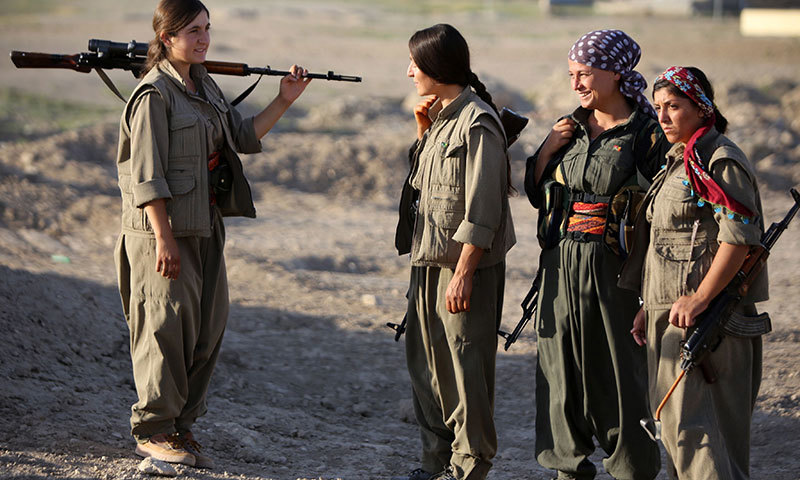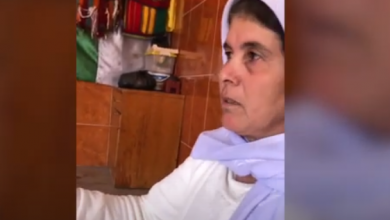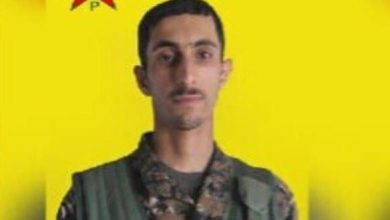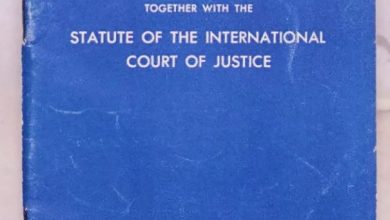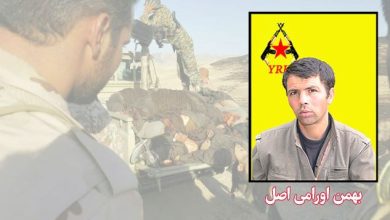Chenur Qovveh’s case illustrates that PJAK’s recruitment network remains active in Iran’s border regions, utilizing relatives and family connections to attract teenagers. At the age of 15, this young woman was introduced to the group by close family members with the promise of reaching Europe. After five years of psychological manipulation, she managed to escape and return to Iran.
In the ongoing review of case files concerning victims of deception and exploitation by Kurdish armed groups in the Iraqi Kurdistan Region, a new file is being published about another Iranian teenager who fell victim to PJAK’s recruitment network at a young age.
Chenur Qovveh, a 21-year-old woman from Mahabad, joined the group while still in the ninth grade and had no real understanding of the organization’s true goals. For years, PJAK, the Iranian branch of the PKK, has used ideological propaganda and deceptive promises—including “women’s freedom” and “migration to Europe”—to recruit teenage girls and boys from Iranian border areas, pulling them into a cycle of violence and lost identity.
In a detailed interview conducted by the Iranian Kurdistan Human Rights Watch with Chenur Qovveh, she recounts how, at 15, she was caught in a web of false promises, encouraged by her cousin (female) and cousin (male), both of whom were members of the group. Secret meetings, psychological conditioning with Abdullah Ocalan’s teachings, and the promise of migration to Europe led her to a decision that kept her in darkness for five years.
Ultimately, exhaustion from the inhumane conditions and the repetitive lies led her to return to Iran in 2023, along with a commander from the operational team, and surrender herself.
Full Transcript of the Interview with Chenur Qovveh
Please tell us about your childhood and life before you knew about PJAK—what was your family like, how far did you go in school, and what were your dreams at that age?
I grew up in a simple family. I studied up to the ninth grade, and after that, precisely because of the connections that were formed within the family, I quit school. Our financial situation wasn’t dire, but we didn’t have many opportunities or much awareness. Like many teenagers in that area, I thought there must be a way to find a better life. But I never imagined that this “way” would take the form of an armed group and a promise of migrating to Europe. At that time, I mainly wanted a better, safer life away from family problems—something that, when you are young and inexperienced, the promise of migration makes very appealing.
How did the first contact and introduction happen? Who played the main role?
The connection started within the family. I was talking to my female cousin, Delnia, on Telegram. Delnia had already joined the group and, in a way, paved the path. My male cousin, Ahad, was also a member. Delnia gradually introduced the subject, saying this path could lead to Europe, which was very tempting for me since I had no job, no money, and no prospects. Initially, everything started with warm messages and conversations. After a while, group members held clandestine meetings in the village and invited me to attend.
What exactly did they say in those secret village meetings? What methods did they use to recruit you?
The meetings were small and hidden. They talked about ideals: “women’s freedom,” “fighting against oppression,” and introduced the books and teachings of Ocalan. But alongside the ideological talk, the promise of migrating to Europe was clearly and repeatedly stressed. Their method was a combination of ideological commitment and creating tangible hope: first, they gave you a sense of belonging and a mission, and then they showed an economic/geographic “way out” of the current situation—namely, Europe. Then, small, one-on-one sessions were held to address any doubts. After about five sessions, I found myself influenced and announced my readiness to go to their headquarters.
You said you were ready to go to the headquarters after a few sessions. What exactly was so persuasive? Was there anything false or misleading that you only realized later?
They were very good at blending hope with ideology. For me, the most important factor was the promise of migration and a better future. Of course, the talk about freedom, books, and teachings also had an effect; when you hear the same things for a while and the people around you talk about them with excitement, you gradually accept it. I later realized that many of those promises were vague and unsubstantiated. But at that time, when you are young and naive, the priority is the dream, not checking facts or asking for details. Later, while I was inside the organization, I realized that the promise of Europe was merely a lure for recruitment, not a practical or specific plan.
What was the situation like when they took you to the headquarters? Did you receive training? What were your expectations, and what was the reality?
When I was transferred to their headquarters in Qandil, the first topic was training. We were told we first had to be trained to participate in the struggle, and after that, we would be sent to Syria or other places. Since I genuinely wanted to fight (or at least thought I did), I accepted. The training was a mix of military and ideological instruction. But it quickly became clear that the main focus was on building a group identity and brainwashing. We were made to sit in long classes and sessions where the teachings and narratives about the enemies and the necessity of the struggle were constantly repeated. Every time I asked, “So, when are you sending us to Syria?” the answers became vague. Instead, most of the centers we were transferred to were for “internal preparations”—that is, preparation for work inside Iran or propaganda operations.
How long did it take for you to realize that the promise of “being sent to Europe” was not real?
I had a bad feeling from the very beginning, but youthful pride and the promises made me continue. Sometime later, when I was sent to the youth battalion and witnessed the internal conflicts and behaviors, the truth became clearer. In practice, I saw that those who were close to the commanders or were flatterers had a better situation, but for people like me who were independent, there was no sign of a good life. Ultimately, after some time passed and I resigned and requested to leave several times—which they refused—I realized they weren’t going to send me anywhere. They mainly wanted to keep me there or use me for other purposes.
What were the daily conditions like there? Describe the psychological and social environment.
The main problem was the psychological condition. We didn’t move around much, and we didn’t have heavy physical labor, but the psychological warfare was constant. Certain orders and news were circulated that we knew weren’t true, but because it was an order, it had to be carried out. Inside the group, the hierarchy and power dynamics led to oppression and disrespect. There were people from remote villages, and the commanders did whatever they wanted. I was sensitive; I often cried and said, “I came here for my people,” but no one listened to these words. In the press section where I was (or where they used me for informational work), the psychological pressure and the conflict between the truth and what had to be published were very distressing for me.
You mentioned that part of the ideological training was used to spread fabricated content. Can you elaborate?
The training was designed so that you had to believe that every piece of news the group created was correct. For example, we were forced to repost news or prepare texts that didn’t align with the truth, but we had to publish it because it was an order. This conflict between knowing the truth and executing the order became harder for me every day, and I felt like I was contributing to a lie. They used psychological techniques to eliminate criticism; the classes and speeches were designed to devalue asking questions.
What changes did you see in your thoughts and behavior over those five years? Did you have any contact with your family?
Contact with my family was completely restricted; free phone calls were not possible. During that time, I sometimes felt like I was becoming a different person, but I resisted internally. I read somewhere that if a person gradually shifts from hope to reality, they can escape, but it’s not easy. I often thought about home and my studies. Ultimately, exhaustion from the conditions and seeing the internal games, favoritism, and flattery that occurred led me to repeatedly consider escaping.
What prompted you to decide to escape? What was the turning point?
The turning point for me was when I was sent to the academy. There, they were supposed to prepare us for work inside Iran—meaning they were training us on how to condition people’s minds. I saw that if this path continued and I attained a high rank, the likelihood of me being sent inside Iran was high, and then seeing my family and returning would become very difficult. The feeling of danger, social pressure, and the possibility of being sent to the worst possible place solidified the decision to escape.
How exactly did the escape happen? How was it planned, and who was with you?
I was with a small team, led by a commander named Ghafour Gholami (organizational name: Tofan), and we were sent to move into Iranian territory (between Marivan and Sanandaj). Ghafour met with his family there once, and that’s where I realized he also intended to escape. After I was sure, I shared the escape plan with him. The night of the escape, I was supposed to write the list of night guards; I arranged it so that the escape route would be open for us. Then we left the headquarters together. In that window of opportunity, I went with Ghafour, and we managed to separate from the group and surrender ourselves to the border guards.
What happened after you escaped and surrendered? What is your current situation?
After escaping, we were able to surrender to the border forces. I am now in a position where I can talk about what I went through. Psychologically, the effects of that period are still with me. Nevertheless, I hope to build a new life. My goal is to document my story so that others are not misled.
Throughout this journey, what was the role of the family members (Delnia and Ahad)? Did you hear from them later?
My cousin Delnia deserted the group in 2024 and is now residing in Turkey. My cousin Ahad, who played the initial role in introducing me, was reported killed on the Turkish border around July or August 2025. I don’t know the exact circumstances; these are the reports I heard, and they had a great impact on me. When I saw that the people I knew had tragic fates, I felt even more strongly that I had made a mistake.
If you wanted to give a message to young girls and boys living in the region, what would you say?
First, don’t fall for the promises. The “freedom” and “migration” offered as bait are often concealment and exploitation. Inquire thoroughly about every proposal, and view relatives who are in the group with skepticism. Second, if someone invites you to a secret meeting, consult with your family or a trusted person before making any decision. And third, if you do get involved, know that escape is possible, but it requires a plan and patience. Most importantly, do not underestimate your mental health.
Iranian Kurdistan Human Rights Watch concludes:
Chenur Qovveh’s case is one of dozens of examples of PJAK’s instrumental use of young Iranian girls. Under the alluring slogans of “women’s freedom” and the guise of political education, the group effectively engages in systematic human rights violations, including deprivation of education, severing family ties, and psychological and media exploitation of young women and girls.
Chenur Qovveh’s testimony demonstrates once again that PJAK’s structure is less of a social or freedom-seeking movement and more of a paramilitary organization with a propaganda and psychological control function that uses children and teenagers for its political interests.
The Iranian Kurdistan Human Rights Watch, while welcoming the voluntary return of this victim, calls on international bodies to hold the PKK and its branches accountable for the blatant violations of children’s and women’s rights within their structure, instead of providing implicit support to such groups.

